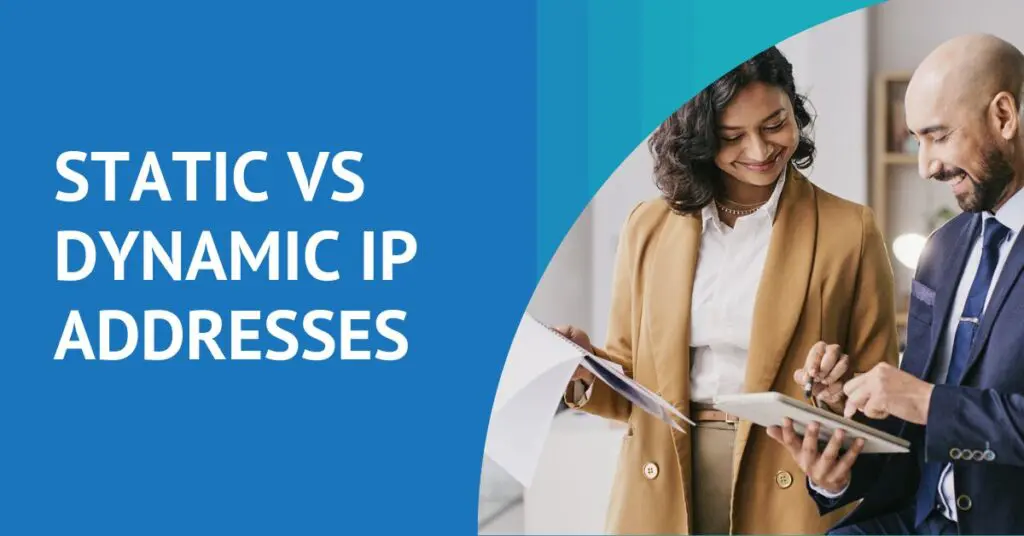Static vs Dynamic IP Addresses: Which is Right for You?

Understanding static vs dynamic IP addresses is essential for making informed decisions about your business internet connection. Let’s explore the key characteristics of each.
A static IP address is a permanent internet address assigned to a specific device. Unlike dynamic addresses which change frequently, a static IP remains consistent, making it ideal for services requiring uninterrupted connectivity, such as website hosting or remote server management.
Static IP Address Advantages
- Consistent Remote Access: Easier for remote employees and IT support to connect to network resources (company databases, file servers, internal websites, network office printer) without IP address changes.
- Reliable Hosting: Ideal for hosting websites, email servers, and other services, ensuring that your domain always points to the correct location.
- Improved Security: Allows for better tracking and monitoring, making it easier to implement robust security measures.
- Enhanced VPN Stability: Simplifies setup and ensures stable connections for virtual private networks (VPNs).
Static IP Address Disadvantages
- Higher Cost: Generally, more expensive than dynamic IP addresses.
- Security Risks: Being permanent, they can be easier targets for hackers if not properly secured.
Dynamic IP Address Advantages
- Cost-Effective: Usually cheaper than static IPs.
- Automatic Assignment: Simplifies network management as IP addresses are assigned automatically.
- Improved Security: Since IP addresses change periodically, it can be harder for attackers to target the network.
Dynamic IP Address Disadvantages
- Inconsistent Remote Access: Changing IP addresses can make it harder for remote employees and IT support to access network resources.
- Less Reliable for Hosting: Not ideal for hosting websites or email servers, as the IP address changes can disrupt service availability.
- Complex VPN Setup: More complicated to configure for VPNs, potentially leading to unstable connections.
Choosing Static vs Dynamic IPs for Your Business
Choosing between a static or dynamic IP address depends on your specific business needs. Here are some things to consider:
- Nature of Operations: If your business requires hosting services or needs stable, secure remote access and VPNs, a static IP is preferable. However, for general internet usage with fluctuating connectivity needs, a dynamic IP might be sufficient and more cost-effective.
- Hybrid Work Models: For hybrid work environments, static IPs can provide reliable access for remote workers, ensuring consistent connectivity and security. Dynamic IPs can still be used effectively with robust VPN solutions but may require more frequent adjustments and management.
- Security Needs: Evaluate the level of security your business needs. Static IPs, when properly secured, offer better tracking and monitoring, while dynamic IPs offer the advantage of changing addresses, which can be less predictable for potential attackers.
- Cost and Budget: Consider the costs associated with each type. Static IPs may come with higher costs but provide stability and reliability crucial for certain operations. Dynamic IPs are generally more affordable and easier to manage.
The Bottomline For Static vs Dynamic IPs
If your business needs stable and consistent access, like hosting a website, running a server, or supporting remote work with VPNs, a static IP address is the better choice because it doesn’t change. However, if you mostly use the internet for general browsing, email, or don’t need a fixed address for any specific service, a dynamic IP address is sufficient and often more cost-effective.
A business can often benefits from using both static and dynamic IP addresses, assigning static IP addresses to critical servers and devices that require constant accessibility, while using dynamic IP addresses for less critical devices or those that don’t require a fixed address. This approach offers flexibility and ensures the reliable operation of essential services.
Talk to an connections expert at Universal Connectivity about the right IP approach for your business. Schedule a free consultation.
Choosing a Business Phone Provider
How do you choose the right business communication partner to help your business thrive? Grab our free, one page checklist. Compiled based on years of experience, this download can help you jump start your search and selection process and:









